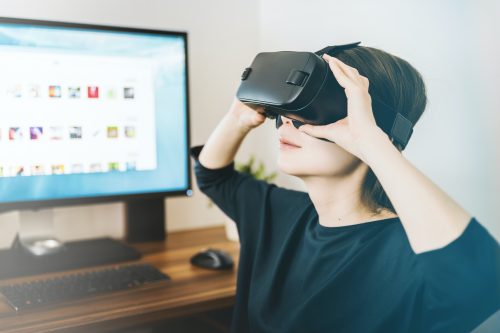By Chris Bozik
Senior Market Research Analyst – Bisk
As environments change, people change. With that change breathes innovation, disruption and a new breed of learning. The COVID-19 pandemic changed the face of higher education as schools large and small had to adapt to the new world draped in front of them. Online learning was suddenly thrust into the foreground and created a lasting change across the education landscape.
From these trials and tribulations, we have learned, we have adapted, and we have emerged better for it. Though it seems we have emerged with a different coat of paint. In the past two years, we have seen a myriad of topics bubble to the top of educators’ and students’ minds alike. I want to share three of the trends that are changing the look of higher education.
Virtual is the New Reality

We have seen an increase in VR adoption for pertinent skills training in industries such as healthcare, construction and telecommunications. Imagine the possibilities of providing ‘virtual’ training for high-risk careers such as firefighters and paramedics. On the education side of things, imagine engineering students being able to virtually interact with the components of a circuit board or learn how to construct a jet engine.
In fact, a study from PwC found that learners were four times faster to train in a virtual environment versus a standard classroom. The study also said learners were 275% more confident in applying the skills that they had learned when transitioning to real-world applications. The impact that this could have on both the velocity and quality of the learning experience truly knows no bounds.
The Skills Revolution is Here (and Growing)
The pandemic created an environment in which workers were looking for quick ways to upskill/reskill to make themselves more competitive in their current role or in the labor market at large. This thought of continuously upskilling has promoted a greater adoption of the ‘lifelong learner’ moniker for workers looking to become and remain competitive in a tight labor market.
Digital transformation has permeated throughout every industry and with it comes a new set of skills that workers must learn to utilize as the world becomes more digital, more visual and more data driven.
Efforts from the World Economic Forum estimate that 50% of all employees will need some form of reskilling by 2025. Possibly even more telling was that they found 40% of core skills are expected to change in the next five years. Skills related to problem solving and technology round out a slew of soft skills deemed necessary for navigating this new business environment.
Increased Focus on Student Outcomes
Student debt and conversations surrounding it have been a hot topic of late. These conversations have brought to light a renewed focus on student outcomes. What are they really getting from their degree; what’s the return on investment? This has led educators to rethink how some topics are taught. It goes back to my point about skills — how can we focus student outcomes on providing them with the skills they need to be successful?
A recent survey from Strada Education Network found that students who received support from their institutions connecting their education to a career felt this better justified the cost of said education. In fact, 83% of respondents who felt they received ‘Excellent’ support felt the costs of education were justified versus just 17% who felt their support was ‘Poor’.
In my native Florida, we have even seen tools created at the state level to help better inform potential and future students. Tools such as MyFloridaFuture help students assess earnings over time based on their institution, degree level and field of study. Tools like this help students make important decisions about planning their education journey and connecting it back to real-world outcomes.
Future Horizons
What does this all mean for the future of higher education? It means that educators and learners alike must find methods of learning from each other to help shape the future of education. The sense of community fostered amid the pandemic needs to remain as we continue this journey together.
If you’d like to learn more about what we do or how we do it, head here for information.
